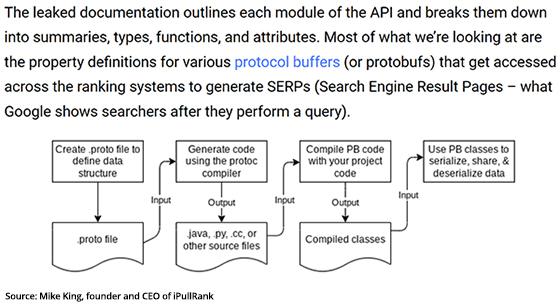
Leaked Google documents has given the search industry proprietary
insight into Google Search, revealing very important elements that the company uses to rank content.
Thousands of leaked documents, which appear to come from Google’s internal Content
API Warehouse, were shared with Rand Fishkin, SparkToro co-founder, earlier this month by Erfan Azimi, CEO and director of SEO of EA Eagle Digital, a digital marketing agency.
Azimi posted a
video Tuesday claiming responsibility for leaking the documents to Fishkin, who is a well-known search expert. Azimi, while not employed by
Google, said he got the documents from a former Googler.
In the video, Azimi claims Google has been lying or misleading the world about its algorithms.
“I want to be as
clear and transparent as to why I decided to pursue this leak,” Azimi said in the video. “There are no financial motives behind it.”
advertisement
advertisement
Azimi accused Google and its spokespeople
of going out of their way to misdirect and mislead search experts, but said he did not reveal the data to allow people to spam the system, but rather to help businesses optimize for Google search.
He framed the information as giving search specialist a look into the ranking algorithm to help SEOs understand how to do their jobs better.
He said the signals may have some relationship
to advertising, but declined to provide specific information that may affect companies paying for Google ads. Instead, he suggested that companies create better websites and not waste time with
generative artificial intelligence (GAI).
Azimi wanted to build a documentary around the findings after the industry had been lied to for years. In early May he made a decision to contact
Fishkin and spoke with a former employee on the Search team, asking that person to participate, but the person declined.
Another search expert -- Mike King, founder and CEO of iPullRank, who
also viewed the documents -- revealed the importance of several strategies such as links. About 2,596 modules are represented in the API documentation with 14,014 ranking attributes.
In this post, King provides a list related to scoring functions, and limited
time and context. He said Google pushed out the code in question in March 2024 and did not remove it until May 7, 2024.
Also in the post, King mentioned “Twiddler” --
re-ranking functions that “can adjust the information retrieval score of a document or change the ranking of a document.”
He also mentioned demotions -- content that can be demoted
for various reasons such as when a link doesn’t match the target site, when a search engine results page signal indicates user dissatisfaction, or product reviews.
“Google
spokespeople have said numerous times that they don’t use ‘domain authority,’” King wrote in the post. “I’ve
always assumed that this was a lie by omission and obfuscation.”
He wrote that Google spokespeople could have created a “confusion-by-way-of-semantics” that would allow them
to “never directly answer the question as to whether they calculate or use sitewide authority metrics.”
That said, King believes Google's spokespeople are generally very
well-meaning folks with a very difficult job to do. "I suspect they are in a very difficult position where they want to help people, but they have to operate within a series of stringent rules to
protect their company," he wrote to Media Daily News. "However, I also think they are in a position of visibility and influence over the SEO community and the information disparity between us
and them allows them a power dynamic that they have abused in some cases specifically as it relates to discrediting and demonizing people in the SEO field like Rand Fishkin."
He wrote that the
DoJ antitrust trial transcript and this documentation leak have helped a bit to equalize that. Ideally, he said it is best for all "to operate from a place of mutual respect."
King also points
out that there are many references to modules and attributes with neural semantic retrieval (NSR) as part of the naming convention.
“Many of these are related to site chunks and
embeddings,” he wrote. “Google has previously discussed 'Neural Matching' as a big focus for
improvements.”
By way of an educated guess, he wrote, NSR stands for Neural Semantic Retrieval, which are features related to semantic search, but in some instances the document mentions
the acronym next to a “site rank.”
"I hope that the SEO community gets back to proactively testing and learning rather than being over reliant on what has proven to be unreliable
information," King wrote in the email.